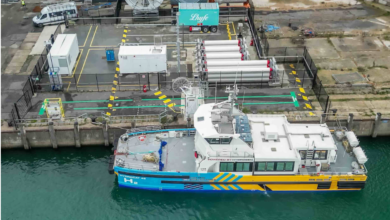Hino joins hydrogen demo study; Advent participates in decarbonising maritime
NEDO funding to encourage and support the introduction of new, zero-emission technologies.

Hino USA is awarded a grant by the New Energy and Industrial Technology Development Organization (NEDO), a Japanese governmental agency, to promote new technology for the energy and environmental sector, along with Hino Motors, Ltd.
The grant supports the demonstration of Hino’s Class 8 hydrogen fuel cell trucks in real-world operations in California ports. This joint study will run through March 2026 and is a collaboration project with Toyota Tsusho Corporation, Toyota Tsusho America Inc., Mitsui E&S Machinery Co. Ltd., PACECO CORP, and Hino.
The NEDO grant supports improving air quality through zero-emission truck technology. Hino, Toyota-Tsusho and Mitsui’s technology of choice for this project is an advanced hydrogen fuel cell electric truck.
The team plans to demonstrate zero-emission operation generated by hydrogen power units in daily drayage operations in and around the ports. Hino will provide several prototype Class 8 Fuel Cell Electric Vehicles (FCEV). The grant program also includes monitoring and analysing the operational and maintenance interval data to optimise the efficiency and safety of the vehicles by Hino and its partners.
Advent Technologies participates in decarbonising maritime transport in Denmark
Advent Technologies Holdings, Inc. announced its participation in a clean energy project in Denmark, aiming to power the ferry service between the Danish island of Læsø and Frederikshavn with a low-carbon propulsion system.
The project is funded by the EU Regional Development Fund ”Innovation Collaboration in the Offshore Cluster” and is facilitated by Energy Cluster Denmark. Partners of the project with Advent include the Læsø Municipality, OSK-ShipTech, Emenergi, Nordhavn Power Solutions, Hydrogen Valley, and the knowledge institutions DBI and AAU Energy.
The partners will work together to identify ideal alternative fuels to replace the ferry’s current diesel powerplant and determine whether the Læsø ferry service will operate effectively daily, using only green fuels. One of the proposals to be examined will be the combination of methanol driven engines and fuel cells. The objective will be to identify a solution for decarbonising the 53 ferry routes in Danish waters.
Besides demonstrating proof-of-concept for this new low-carbon solution, the project will also seek to define exact installation requirements for the new technology and identify a thorough process for refuelling and methanol storage in passenger ferries.
